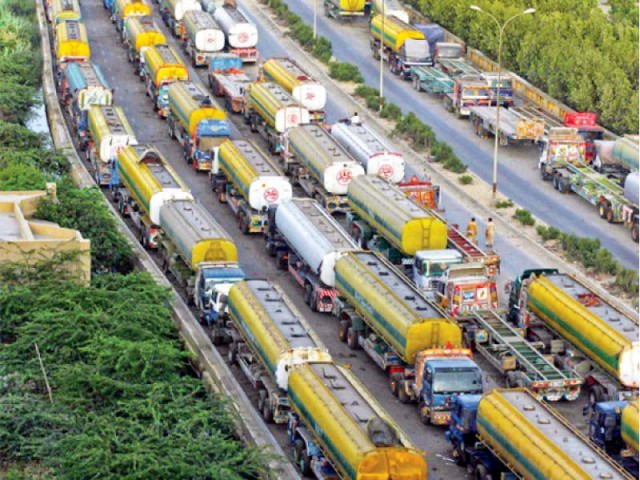Dispute over sales tax on services distribution: Oil Tankers’ Association threatens strike
It’s the third strike call in six months, will disrupt fuel supplies to pumping stations, power generation companies

The disruption of supplies may create fuel shortages across the country, which will affect the transport sector and power generation companies alike. PHOTO: FILE
It is the third strike call the association has given in the last six months, as the earlier two strikes were called off over request of the Ministry of Petroleum.
The ministry promised to resolve the issue but has so far failed due to non-cooperative behaviour of the provincial governments.
Sindh and Punjab have levied sales tax on transportation services but they have failed to work out the distribution formula. Punjab is demanding the tax to be recovered on the basis of the destination of the transport carriage while Sindh seeks to fix the point of origination as base of tax collection.
Federal minister for petroleum, Shahid Khaqan Abbasi, said that the issue is related to taxation matters. “It’s a tax issue - not a petroleum ministry issue. However, we are working to resolve it,” said Abbasi.
Meanwhile, Senator Taj Muhammad Afridi, who is playing a mediator’s role between the government and the association, said the August 25 strike seems imminent.
“Both governments have failed to come up with a workable solution despite numerous meetings among stakeholders,” said Afridi.
The resolution of the issue requires amendments in the respective sales tax on services laws of the provincial government. However, finance departments of provincial governments did not propose amendments in the budget that the provincial assemblies passed in June.
“The members will not ply their vehicles if the cartage bills are not cleared by August 24th”, said the association in a letter to the Ministry of Petroleum on Thursday, giving it a week’s deadline.
The disruption of supplies may create fuel shortages across the country, which will affect the transport sector and power generation companies alike.
It takes usually four days to cover the shortfall resulting from one-day disruption in supplies while the power generation companies usually have at least seven days fuel to run their plants.
The relations between the federal and provincial revenue authorities have soured in recent weeks after the federal government disallowed input tax adjustments by amending the respective federal laws in June this year.
This has forced the businesses to pay double taxes, increased the cost of doing business besides and created liquidity problems.
The Sindh Chief Minister indicated this week that the provincial government might take the federal government to court if the issue of input tax adjustment remains unresolved.
Due to non-resolution of the issue, oil marketing companies (OMCs) are withholding 20% of the cartage bill, creating liquidity problems for the people involved in oil transportation business. OMCs fear that if they paid the full amount, the provincial revenue authorities may recover the tax from their accounts.
The federal government has already started recovering this sales tax on services from the consumers of petroleum products by building it into the cost of the products. It is collecting 14 paisa per litre from the high-speed diesel consumers and 2 paisa from the petrol consumers since 1st of this month.
“There is no agreement on the shares of the provincial governments,” said OCTA Tax Consultant Ashfaq Tola. He said that the FBR and the Petroleum Ministry tried its best to resolve the dispute.
“The owners are forced to borrow funds from expensive sources to run their fleets due to non-payment of cartage bills,” said OCTA Acting President Babar Ismail.
In addition to dispute over distribution formula, the issue of mode of collection also remains unresolved, said officials involved in the negotiations. They said that Sindh law says that the tax can be collected in value-addition tax mode and at reduced rates as well. The Punjab law allows collecting the tax only in VAT mode.
Due to non-resolution of the issue of distribution formula, oil tankers are not registering with provincial authorities.
Published in The Express Tribune, August 21st, 2016.
Like Business on Facebook, follow @TribuneBiz on Twitter to stay informed and join in the conversation.



















COMMENTS
Comments are moderated and generally will be posted if they are on-topic and not abusive.
For more information, please see our Comments FAQ